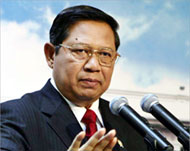Papua clampdown after protests
A security clampdown has been imposed after three policemen and a soldier were killed in protests against an American-run mine in Papua province in Indonesia.

Armed police patrolled Jayapura on the northeastern shore of Papua, about 3,500km from Jakarta, on Friday.
The violence in Jayapura on Thursday, has prompted fears of more protests against the US firm Freeport-McMoran Cooper & Gold which runs the giant mine that demonstrators say should be shut down.
Last month mine operations were halted for four days before protesters, mostly illegal miners, left the site near the town of Timika.
There were no reports on Friday of fresh protests or trouble throughout the vast province including in Timika, police said. The mine has been operating normally this week.
A police spokesman said: “The situation in Jayapura and the surrounding areas is now back to normal. Shops are already open, buses running normally.”
He said 57 people had been detained after clashes on Thursday during which dozens of people were wounded when university students pelted policemen with stones to stop them clearing a roadblock.
Police said that they were hunting for more perpetrators and called on the people to remain calm and restrain themselves.
 |
|
Susilo rejected demands for the |
Susilo Bambang Yudhoyono, the Indonesian president, rejected demands for the immediate closure of the mining operation, the country’s largest taxpayer, but said he would assign ministers to examine social grievances related to the mine.
The Freeport operation has been criticised over its environmental impact, the share of revenue going to Papuans, and the legality of payments to Indonesian security forces who help guard the site.
Ease restrictions
Human Rights Watch (HRW) in New York urged Indonesia‘s government to allow an independent investigation into the violence in the region and to ease restrictions on foreign journalists and aid agencies entering the province.
Brad Adams, Asia director of HRW, said: “The Indonesian government should immediately grant access to an independent investigation … to determine how the violence escalated.”
There were unconfirmed reports of two civilian deaths in the clashes. In a statement, HRW said at least six protesters had been seriously injured.
Indonesia has defended its curbs on foreign journalists and non-governmental organisations in Papua, saying it was worried that foreign groups and churches might create conflict by encouraging Papuans to campaign over charges of human rights violations.